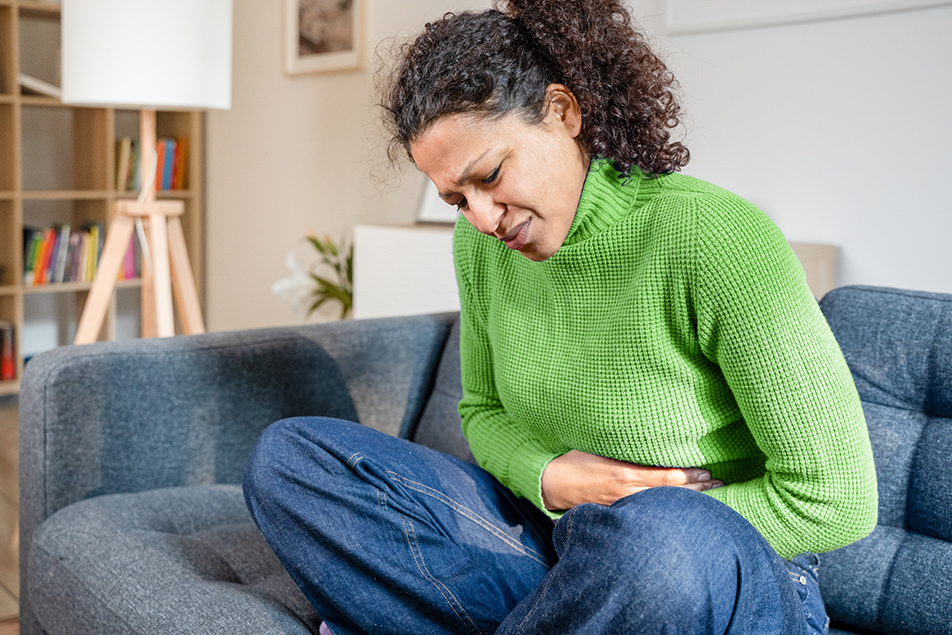
Everyone has a different term for stomach and intestinal-related illnesses, but they are often referred to as a stomach bug, flu or virus. No matter the term, when sickness hits, it can hit hard, rendering you weak, exhausted and miserable. For help, we turned to Katie Hinman, MSN, FNP-C, PPG – Family Medicine. She offered guidance on navigating the illness, finding relief from problematic symptoms and the best points of prevention for staving off future infections.
The stomach bug or stomach flu is an infection of the intestinal tract commonly caused by a virus. Norovirus is the most likely culprit in adults, and rotavirus is the most common source in children.
Causes
Norovirus is very contagious, and anyone can become infected. The most common ways norovirus can spread or be contracted are from:
- Coming in direct contact with an infected person
- Consuming contaminated food or water, which could lead to viral gastroenteritis
- Sharing utensils, food or personal items with someone who has the virus
- Touching contaminated surfaces, then touching your eyes, nose or mouth with unwashed hands
Symptoms and treatment
Symptoms of a norovirus infection usually begin suddenly but are generally short-lived, lasting less than seven days. The stomach flu frequently causes symptoms such as:
- Nausea
- Vomiting
- Diarrhea
- Stomach pain/cramps
Some individuals may also experience less common symptoms, which can include:
- Fever
- Chills
- Headache
- Muscle aches
The biggest concern with the stomach flu is dehydration, which can result in the loss of essential electrolytes. For this reason, it’s important to replenish your body with beverages like Gatorade®, Pedialyte® or sugar-free electrolyte packets, in addition to consuming adequate amounts of water to stay hydrated.
It’s also important to settle down the digestive tract with liquids only for the first 1-2 days, then slowly advance the diet to soft, bland foods such as bananas, rice, applesauce, crackers and toast. Some at-home remedies that could prove helpful as you recover might include a heating pad for your abdomen for stomach cramping, plenty of fluids and rest, and using ginger or peppermint to help ease nausea and vomiting. [1] Remember to check with your healthcare provider for further guidance and before starting anything new to ensure these treatment options are right for you.
Points of prevention
One of the most impactful things you can do to keep yourself and others safe while preventing the spread of germs like the stomach flu is through proper handwashing. Beyond that, to prevent yourself or others from contracting norovirus, it’s important to disinfect surfaces that are contaminated, rinse fruits and vegetables well, cook food thoroughly, stay home when sick and avoid preparing food for others when ill.
Also, while there’s no medicine or treatment to prevent the stomach flu, you can boost your immune system by consuming vitamins like A, C, E and zinc to help you better fight off the infection. This can be done by eating whole foods like fruits, vegetables, nuts and seeds. If you choose to use a supplement, you should wait to take them while feeling ill. They are best digested with food and can worsen nausea on an empty stomach. Also, please consult your physician before stopping your routine/daily medications or incorporating new supplements into your diet.
When to see a doctor or seek emergency care
For most, a norovirus infection will clear up within a few days and isn’t life-threatening. However, in some instances, this infection can be severe. It’s important to contact your primary care provider or go to the emergency department if you experience any of the following symptoms:
- High fever
- Bloody diarrhea
- Feeling dizzy or lightheaded
- Unable to keep food or liquids down
- Fever with decreased urine output
- Crying with a lack of tears (in children)
Also, if you cannot think clearly, please have someone else drive you to the hospital or call 911.
Sources
[1] Nocerino, R., Cecere, G., Micillo, M., Marco, G., Ferri, P., Russo, M., Bedogni, G., Canani, R. (2021). Efficacy of ginger as an antiemetic in children with acute gastroenteritis: A randomised controlled trial. Alimentary Pharmacology & Therapeutics, 54 (1), 24-31.



